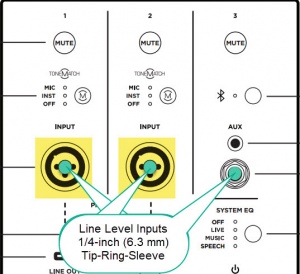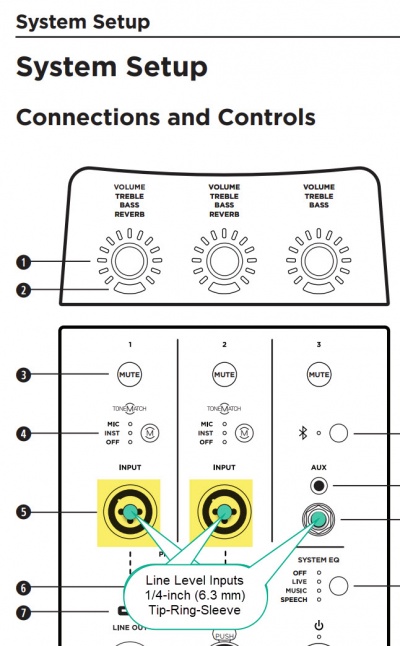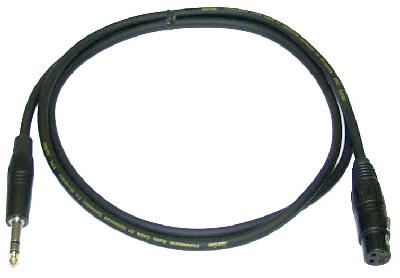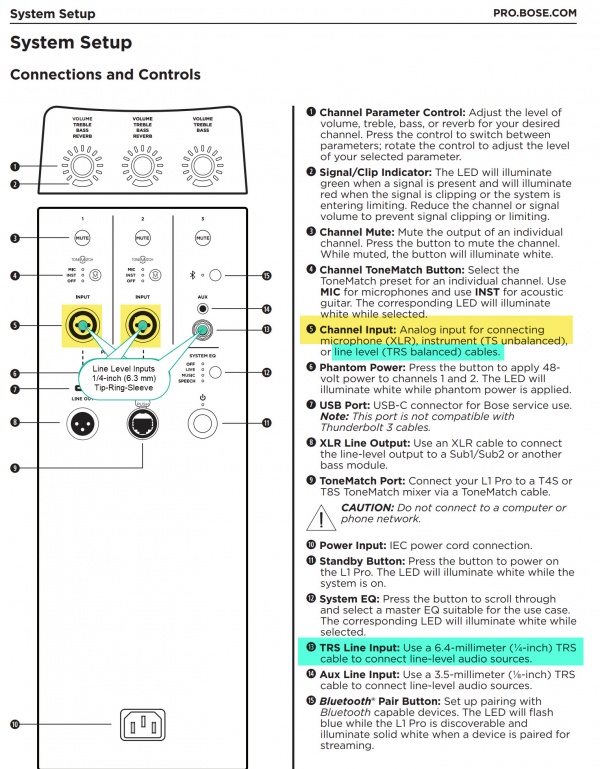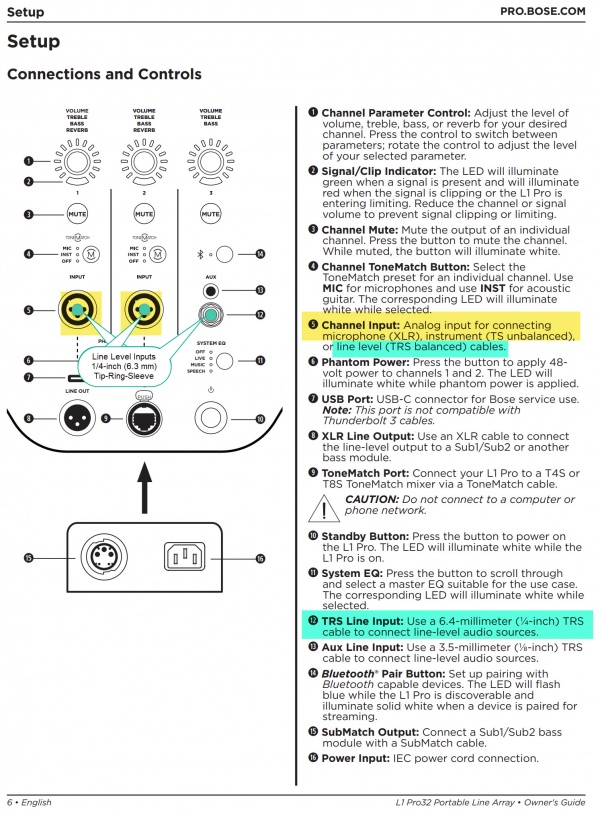Difference between revisions of "Mixer to L1 Pro"
m |
m |
||
| (8 intermediate revisions by the same user not shown) | |||
| Line 5: | Line 5: | ||
|RightBody = | |RightBody = | ||
;For best results: Connect the output(s) of a mixer to the line-level inputs of the L1 Pro. These are the 1/4-inch (6.3 mm) Tip-Ring-Sleeve jacks on channels 1, 2, 3. | ;For best results: Connect the output(s) of a mixer to the line-level inputs of the L1 Pro. These are the 1/4-inch (6.3 mm) Tip-Ring-Sleeve jacks on channels 1, 2, 3. | ||
| − | ;Note: The XLR jacks on the L1 Pro are microphone-level signal sources, not line-level outputs found on most mixers. | + | ;Note: The XLR jacks on the L1 Pro are microphone-level signal sources, not line-level outputs found on most mixers. The L1 Pro line-level inputs are the 1/4-inch (6.3 mm) Tip-Ring-Sleeve jacks on channels 1, 2, 3. |
| + | |||
[[File:L1 Pro Line Level Inputs small.jpg|300px]] | [[File:L1 Pro Line Level Inputs small.jpg|300px]] | ||
| − | |||
| − | ; | + | ;Compatibility with Line-Level sources (e.g., many mixer outputs) to the XLR Inputs (Inputs 1 and 2) on the L1 Pro. |
| − | :Connecting a line-level source (such as mixer output) to a mic-level input | + | :Connecting a line-level source (such as mixer output) to a mic-level input can cause the sound to be loud and distorted because the line signal is much stronger than what the mic input will accept. Inputs and outputs on many mixers are switchable for either mic or line-level operation. If the mixer has the option to switch the output to mic-level, then you can use the XLR inputs on the L1 Pro. Otherwise, you may have to turn down the output of the mixer or the input on the L1 Pro or use the 1/4 inch (6.3 mm) Tip-Ring-Sleeve inputs instead. |
| + | |||
| + | ;Channel 1 & 2 Input: Max Input Signal | ||
| + | :+10 dBu (XLR); +24 dBu (TRS) | ||
| + | ;Channel 3 Input: Max Input Signal | ||
| + | :+11.7 dBu (3.5 mm); +24 dBu (TRS) | ||
| + | ;Channel 1 & 2 Input: Trim | ||
| + | :0 dB, 12 dB, 24 dB, 36 dB, and 45 dB analog gain steps automatically selected and compensated by DSP | ||
| + | |||
| + | |||
| + | |||
| + | |||
| + | |||
| + | |||
|Categories = | |Categories = | ||
| Line 39: | Line 52: | ||
If the mixer has 1/4-inch (6.3 mm) Tip-Sleeve (unbalanced) outputs (unbalanced), use 1/4-inch (6.3 mm) Tip-Sleeve cables to connect to the L1 Pro line-level inputs. | If the mixer has 1/4-inch (6.3 mm) Tip-Sleeve (unbalanced) outputs (unbalanced), use 1/4-inch (6.3 mm) Tip-Sleeve cables to connect to the L1 Pro line-level inputs. | ||
| − | [[File: | + | [[File:TsMtsM.png|400px]] |
| − | |||
If the mixer has XLR outputs, use XLR Female to 1/4-inch (6.3 mm) Tip-Ring-Sleeve cables to connect to the L1 Pro line-level inputs. | If the mixer has XLR outputs, use XLR Female to 1/4-inch (6.3 mm) Tip-Ring-Sleeve cables to connect to the L1 Pro line-level inputs. | ||
| Line 79: | Line 91: | ||
[[File:L1 Pro32 Line Level Inputs.jpg|600px]] | [[File:L1 Pro32 Line Level Inputs.jpg|600px]] | ||
| + | == Specifications for the Mixer Section == | ||
| + | [[File:L1 Pro Mixer Section Specifications.jpg]] | ||
---- | ---- | ||
Latest revision as of 18:06, 19 August 2024
Connect a Mixer to an L1 Pro
- For best results
- Connect the output(s) of a mixer to the line-level inputs of the L1 Pro. These are the 1/4-inch (6.3 mm) Tip-Ring-Sleeve jacks on channels 1, 2, 3.
- Note
- The XLR jacks on the L1 Pro are microphone-level signal sources, not line-level outputs found on most mixers. The L1 Pro line-level inputs are the 1/4-inch (6.3 mm) Tip-Ring-Sleeve jacks on channels 1, 2, 3.
- Compatibility with Line-Level sources (e.g., many mixer outputs) to the XLR Inputs (Inputs 1 and 2) on the L1 Pro.
- Connecting a line-level source (such as mixer output) to a mic-level input can cause the sound to be loud and distorted because the line signal is much stronger than what the mic input will accept. Inputs and outputs on many mixers are switchable for either mic or line-level operation. If the mixer has the option to switch the output to mic-level, then you can use the XLR inputs on the L1 Pro. Otherwise, you may have to turn down the output of the mixer or the input on the L1 Pro or use the 1/4 inch (6.3 mm) Tip-Ring-Sleeve inputs instead.
- Channel 1 & 2 Input
- Max Input Signal
- +10 dBu (XLR); +24 dBu (TRS)
- Channel 3 Input
- Max Input Signal
- +11.7 dBu (3.5 mm); +24 dBu (TRS)
- Channel 1 & 2 Input
- Trim
- 0 dB, 12 dB, 24 dB, 36 dB, and 45 dB analog gain steps automatically selected and compensated by DSP
- For best results, connect the output(s) of a mixer to the line-level inputs of the L1 Pro.
Most mixers have line-level outputs. The L1 Pro line-level inputs are the 1/4-inch (6.3 mm) Tip-Ring-Sleeve jacks on channels 1, 2, 3.
The L1 Pro line-level inputs are the 1/4-inch (6.3 mm) Tip-Ring-Sleeve jacks on channels 1, 2, 3.
- Don't connect Line-Level Inputs to the XLR Inputs (Inputs 1 and 2) on the L1 Pro.
- Connecting a line-level source (such as mixer output) to a mic-level input will cause the sound to be loud and distorted because the line signal is much stronger than what the mic input will accept. Inputs and outputs on many mixers are switchable for either mic or line level operation.
The nomenclature of "line" is from "telephone line." When the telephone network was being developed in the early 20th century, the nominal level of a telephone signal as it travelled along telephone cables was around 1 volt. So, 1 volt was a "line level" signal. [1]
Mixer Outputs
If the mixer has 1/4-inch (6.3 mm) Tip-Ring-Sleeve (balanced) outputs, use 1/4-inch (6.3 mm) Tip-Ring-Sleeve cables to connect to the L1 Pro line-level inputs.
![]()
If the mixer has 1/4-inch (6.3 mm) Tip-Sleeve (unbalanced) outputs (unbalanced), use 1/4-inch (6.3 mm) Tip-Sleeve cables to connect to the L1 Pro line-level inputs.
If the mixer has XLR outputs, use XLR Female to 1/4-inch (6.3 mm) Tip-Ring-Sleeve cables to connect to the L1 Pro line-level inputs.
Mixer to Single L1 Pro
If you are connecting microphones or instruments to your L1 Pro and you want to add a mixer to your system, you will want to connect the mixer to L1 Pro input 3 using the 1/4-inch (6.3 mm) Tip-Ring-Sleeve jack.
You will want to get a mono output from the mixer to connect to the single input jack on input 3. For tips on how to do that, see: Stereo Mixer to Mono L1
Settings on the L1 Pro
If you connect to channels 1 and 2
- Set ToneMatch Switch to OFF
- Set Bass and Treble Controls to 12:00 o'clock (this is flat)
- Set Reverb fully counter-clockwise (this is off)
- Set the Volume so you see solid green. If you see solid red, turn down the volume
If you connect to channel 3
- Set the Volume so you see solid green. If you see solid red, turn down the volume
- Important - MUTE any channels you are not using.
Mixer to Two L1 Pro
Connect the mixer Left Output to one L1 Pro input 3 using the 1/4-inch (6.3 mm) Tip-Ring-Sleeve jack.
Connect the mixer Right Output to the other L1 Pro input 3 using the 1/4-inch (6.3 mm) Tip-Ring-Sleeve jack.
